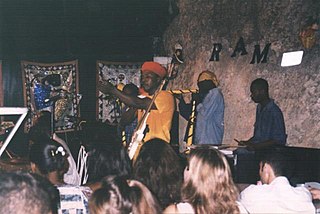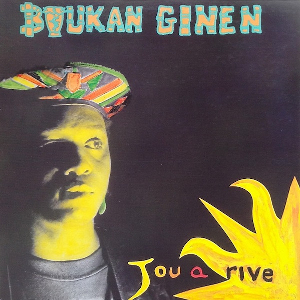Related Research Articles
The music of Haiti combines a wide range of influences drawn from the diverse population that has settled on this Caribbean island. It often has hints of French, African rhythms, Spanish elements and others who have inhabited the island of Hispaniola and minor native Taino influences. Styles of music unique to the nation of Haiti include music derived from rara parading music, twoubadou ballads, mini-jazz rock bands, rasin movement, hip hop Creòle, the wildly popular compas, and méringue as its basic rhythm. Haitian music is influenced mostly by European colonial ties and African migration. In the case of European colonization, musical influence has derived primarily from the French.

Boukman Eksperyans is a mizik rasin band from the city of Port-au-Prince, Haiti, Grammy nominated for their debut album Vodou Adjae. The band derives its name from Dutty Boukman, a vodou priest who led a religious ceremony in 1791 that is widely considered the start of the Haitian Revolution. The other half of the band's name, "Eksperyans", is the Haitian Creole word for "experience", and was inspired by the band's appreciation of the music of Jimi Hendrix. The band was at the height of its popularity in 1991 when the presidency of Jean Bertrand Aristide was overthrown in a military coup d'etat. Like many other artists and performers, Boukman Eksperyans fled the country to live in exile. During their time abroad, the band performed and spoke out against the military dictatorship of Raoul Cédras. In 1994, after Aristide was restored to power, the band returned to Haiti, where they continued to play concerts, record albums, and perform at the Carnival celebrations.
Xenophile Records is a Nashville, Tennessee based sublabel of Green Linnet Records that specializes in world music from Madagascar, Nigeria, Haiti, Chile, Argentina, Finland and other countries. The label was started in 1992 in Danbury, Connecticut by Wendy Newton as a subsidiary of Green Linnet. In 2006, Newton sold Green Linnet and Xenophile to Digital Music Group, an aggregator of downloadable music. DMG sold the rights to manufacture and distribute Green Linnet and Xenophile physical compact discs to Compass Records.

RAM is a mizik rasin band based in the city of Port-au-Prince, Haiti. The band derives its name from the initials of its founder, songwriter, and lead male vocalist, Richard A. Morse. The band's music has been described by Morse as "Vodou rock 'n' roots", and has been one of the prominent bands in the mizik rasin musical movement in Haiti. RAM began performing together in 1990, and recorded their first album in 1996. The band's music incorporates traditional Vodou lyrics and instruments, such as rara horns and petro drums, into modern rock and roll. The band's songs include lyrics in Haitian Creole, French, and English.

Michel Joseph Martelly is a Haitian musician and politician who was the President of Haiti from May 2011 until February 2016.
"Fèy" is a traditional Vodou folk song in Haiti. In Haitian Creole, "fèy" means "leaf", and the lyrics of the song describe a leaf falling from a tree. Like many traditional songs in Vodou folklore, the lyrics of "Fèy" can hold many meanings, both religious and political. At least two mizik rasin bands in the 1990s sang adaptations of the traditional song. A version first performed by RAM in 1992 was banned throughout Haiti during the remaining years of the Raoul Cédras military junta.
Rasin, also known as Haitian roots music, is a musical style that began in Haiti in the 1970s when musicians began combining elements of traditional Haitian Vodou ceremonial and folkloric music with various musical styles. The late 20th century style of this music links to the roots of Vodou tradition, where it came to be known as mizik rasin later in Haitian Creole. Modern-day, the movement is often referred to simply as "rasin" or "racine".
Jean-Claude "Tiga" Garoute was a Haitian painter and sculptor. Born in Jérémie, Garoute co-founded a museum of ceramic art in Haiti named Poto-Mitan. An abstract painter, he participated in art festivals throughout the world.
Richard Auguste Morse is a Puerto-Rican-born Haitian-American musician and hotel manager currently residing in Port-au-Prince, Haiti. Morse manages the Hotel Oloffson, and is the founder of a mizik rasin band, RAM, named after his initials. Morse is married to the band's lead female vocalist, Lunise Morse, and has two children. Morse and his band are famous in Haiti for their political songs and performances critical of the Raoul Cédras military junta from 1991 to 1994. In the early 2000s, Morse has also criticized Jean-Bertrand Aristide and Fanmi Lavalas through his music. Morse is a United States citizen. His cousin Michel Martelly is a musician, right-wing Haitian politician and former President of Haiti. Richard Morse repeatedly expressed support for Martelly in the 2010 presidential elections in Haiti. By the end of 2012, he had distanced himself from the Martelly government.
Radio Tele Ginen is a politics, sports, and music Haitian radio and television station based in Port-au-Prince.
As in many developing countries, radio reaches the widest audience in Haiti. Estimates vary, but more than 300 radio stations are believed to broadcast throughout the country. Talk show programs serve as one of the few ways in which ordinary Haitians can speak out about politics and the government. A law passed in 1997 declares the airwaves to be the property of the government, but at least 133 unlicensed radio stations operate freely. In addition, there are 50 community-based stations throughout the country.
Boucan-Carré is a commune in the Mirebalais Arrondissement, in the Centre department of Haiti. It has 48,700 inhabitants.
Barikad Crew is a rap kreyòl group from Port-au-Prince, Haiti.

Ludovic Lamothe was a Haitian composer and virtuoso pianist. He is considered one of Haiti's most important classical composers.
Crime in Haiti is investigated by the Haitian police. Since the late 2010s, the country has suffered from widespread gang warfare and civil unrest, including a massive prison breakout in 2024. It also suffers from extreme corruption and high levels of sexual violence.
John Steve Brunache is a famous Haitian musician who came to prominence during the 80's and 90's. He is an influential figure who spoke on the issues of the times with such songs as "La Relev", "Chimen Limye", and "timoun yo".
Haitian Carnival is a celebration held over several weeks each year leading up to Mardi Gras. Haitian Defile Kanaval is the Haitian Creole name of the main annual Mardi Gras carnival held in Port-au-Prince, Haiti.
Eddy François is a Haitian musician,

Jou a Rive is the debut album by the Haitian band Boukan Ginen, released in 1995. It was originally released in Haiti in 1993. Most of the lyrics were sung in Creole. "Pale Pale W" had been voted Best Carnival Song at Haitian Carnival. The band supported the album with a North American tour.
References
- Cited References
- ↑ Averill, Gage (1994). Jou a Rive, Boukan Ginen, inner liner notes. Xenophile Records, released 1995.